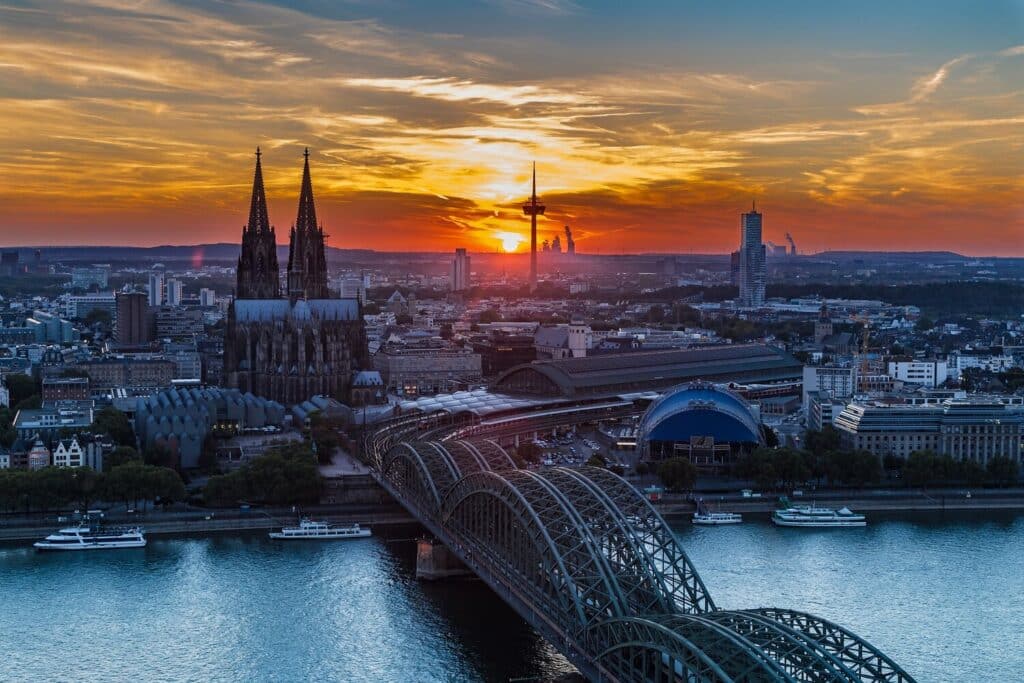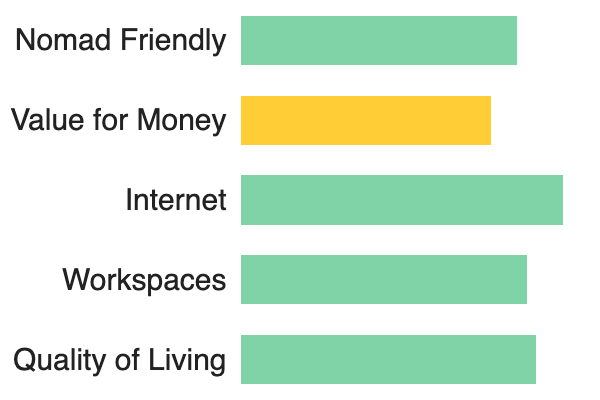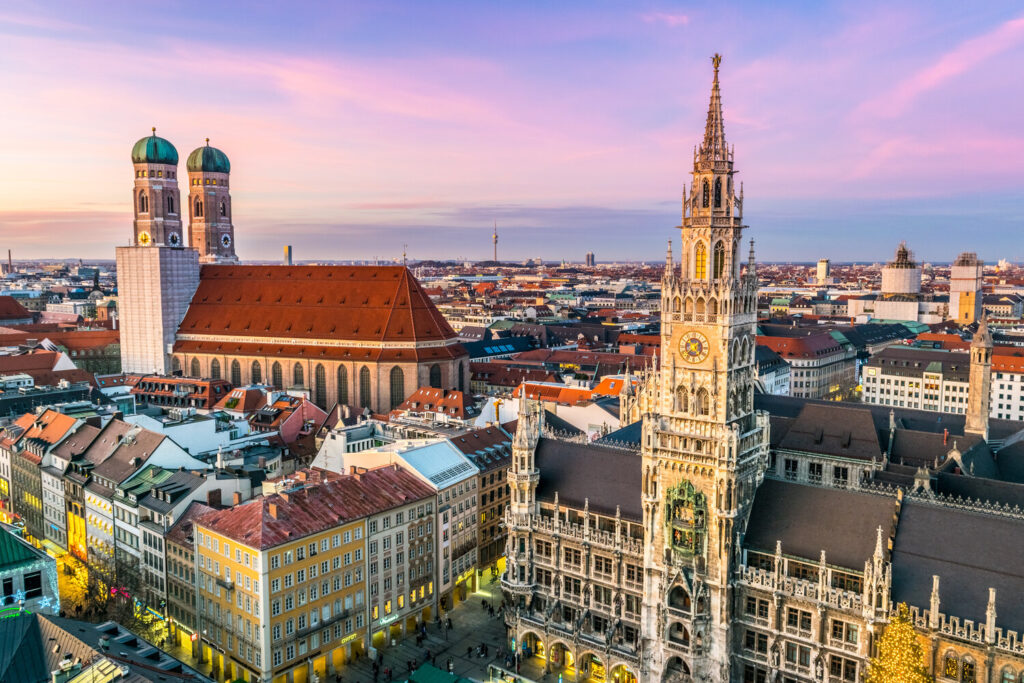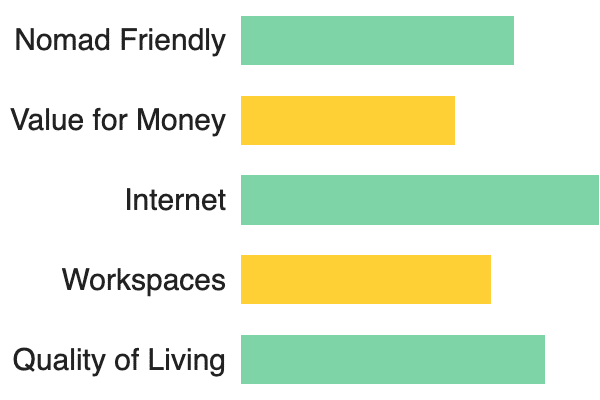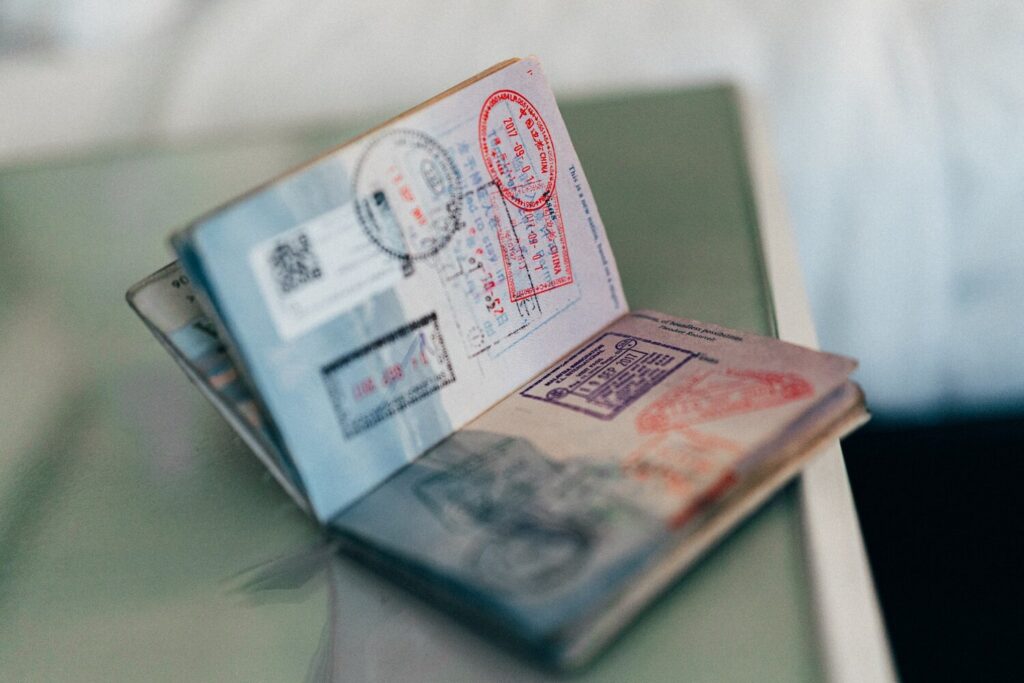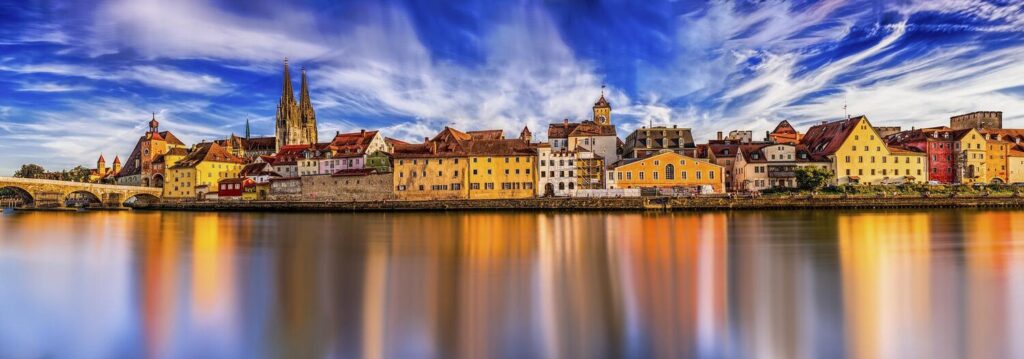
Digital Nomad Germany Guide
From the art collectives of Berlin to the enchantments of the Black Forest, there are so many reasons for digital nomads to sojourn in Germany.
Taking a purely practical standpoint, it is one of the most developed countries in Europe, with all its major cities boasting excellent public transport systems as well as access to quality healthcare and education. Admittedly, its internet speeds aren’t the greatest – many an article has been devoted to dissecting how a nation so apparently tech-forward can lag so far behind when it comes to broadband and wireless connectivity – but it has still managed to position itself as a booming environment for start-ups and innovators, who come from all over the world to immerse themselves in its cosmopolitan, creative metropolises.
Not only is Germany one of the largest countries in Europe, boasting an enviable diversity in terms of terrain and natural beauty, but it also has one of the largest English-speaking populations in Europe, making it a lot easier to communicate than in, say, Latvia or France. Its cities are filled with green spaces, the streets are comparatively safe and the country as a whole is largely LBGT-friendly: Berlin and Cologne, in particular, are well known for their Pride parades.
Have we mentioned the food? Aside from Germany’s well-known affinity for sausages – be they bratwurst, weisswurst, leberwurst of frankfurter – there’s also spatzle (egg noodles), rollmops (pickled herring), sauerbraten (marinated meat stew) and kartoffelsalat (potato salad). Fun fact: the doner kebab as we know it was actually invented in Berlin by Turkish immigrants, while pickled cabbage sauerkraut is actually an import from China. Suffice to say, Germany was, and continues to be, a melting pot of multiculturalism.
Whether you’re more attracted by the modern cultural vibrancy of Berlin or the historical importance of mercantile Hamburg, there’s something for every temperament in Europe’s economic heavyweight.
Germany Digital Nomad Visa
If you’re a citizen of the European Union, the European Economic Area or Switzerland, congratulations! You can ignore the complex web of bureaucracy and work in Germany without a care in the world. Additionally, if you are from the UK, USA, Australia, Canada, Israel, Japan, New Zealand, or South Korea, you are also able to skip the visa step and go straight to the residence permit stage (more on that below).
Some digital nomads who plan to work in Germany for less than 90 days in a 180-day period don’t notify the authorities at all and simply enter as a tourist. Though it is possible to fly under the radar, it should also be noted that this is technically illegal, unless you are a freelance performer, interpreter, tour guide, or model. In these specific cases, you don’t need to apply for a work visa or a residence permit, provided your stay in the country does not exceed 90 days over a 180-day period.
Unlike countries such as Estonia and Croatia, Germany doesn’t have a formal digital nomad visa. Instead, they have a visa for freelancers (Freiberufler), alternatively known as a D Visa or a job-seeker visa. This grants a 90-day stay for people working in the so-called ‘liberal’ professions, which include everything from lawyers, accountants, and tax consultants, through engineers and architects, all the way to doctors and journalists. Essentially, anybody who is selling their skills rather than a physical item. If you’re a digital nomad, the Freiberufler is probably the visa for you. However, if you are engaged in, for example, retailing freezers, you will need to apply for a Gewerbe visa, which comes with additional requirements, including registering with the trade office and paying trade tax.
Freelance “Freiberufler” Visa
In order to obtain the freelance visa, you’ll need to make an appointment at the German embassy in your home country. Typically, you’ll be asked to supply quite a long list of documents, some easier to acquire than others. First, there’s the fairly standard national passport, biometric photographs, visa application form, and visa application fee. Rather as if you were applying for an actual job, you’ll also need to submit a cover letter, CV, recommendation letters, and samples of your previous work. In addition to offering up your experience for scrutiny, evidence of your continued financial security is also expected, including bank statements to show you can support yourself and letters from at least two employers who have committed to paying you while you are in Germany. On top of that, if your profession requires specific documentation, for instance, a licence to practice law or medicine, that will also need to be shown, as will any education certificates pertaining to your job. Finally, you’ll need to create a freelance plan, showing how much money you plan to make and your expected expenditure, as well as purchase health insurance.
It’s important to note that the Freiberufler does not automatically entitle you to work in Germany, it only grants you entry, so that you can then apply for a residence permit. This residence permit is what actually allows you to live and work in the country.
Once you enter Germany, you have 90 days to apply for your residence permit. The first thing you should do is book your appointment with the Immigration Office (Ausländerbehörde). Getting a slot can be a slog, so it’s crucial you do this before even thinking about preparing the documents. Once that issue has been navigated, the next step will usually involve arranging a meeting at the local citizens’ office (Bürgeramt) to register your address, which must be done within two weeks. Once you’ve attended your registration appointment (Anmeldung), you will receive your registration certificate (Anmeldebescheinigung) on the spot, while your tax ID will be posted to the address you supplied.
Once you have your registration certificate and your tax ID, you can register with the tax office. Unfortunately, the Fragenbogen zur steuerliche Erfassung (Questionnaire for Taxation) has to be completed in German. At this point, you may be ready to throw in the towel and hire a tax accountant. However, for the determinedly self-reliant, there are several websites out there that will take you through the form step by step so you can essentially fill in the details without understanding a word of Deutsch. Some of the key information you’ll need to hand inare your tax ID, bank account details, estimates of both expected revenues and expenses, and descriptions of your freelance work. Though you may struggle completing the Fragenbogen zur steuerliche Erfassung, at least the German authorities have made it easy for you to attempt the feat by offering a number of options: online form, printed form that can be handed in in person or printed form that can be posted in the mail. If you’ve done all the above correctly, you’ll be in possession of a tax number (not the same, it should be stressed, as the tax ID).
While the registration certificate and the tax questionnaire are the most complicated parts of obtaining a residence permit, there are also several other steps before you reach the Immigration Office. If you had to apply for a Freiberufler visa, you’ll be ahead of the game because at this stage you’ll need to prove you can support yourself through both showing evidence of funds in your bank account and supplying letters from present or future employers that prove you have a steady income lined up. Health insurance is mandatory, while opening a German bank account can make life a lot easier when it comes to paying bills and receiving payments, particularly if you plan to be in Germany long term.
Finally, once all the above have been completed, you’re now ready to go to the Immigration Office (Ausländerbehörde). Hopefully, you remembered to book that appointment weeks ago! All being well, you’ll receive your residence permit, initially valid for up to one year but usually extendable, provided your situation hasn’t changed. Eventually, if you decide your digital nomad days are behind you and Germany is where you want to work for a much longer time, you can apply for a permanent residence permit.
This all might seem like a huge headache – and, honestly, it is. The easiest thing to do if you plan to stay for up to a year in Germany as a digital nomad is just to pay a company that specialises in these things to do it for you.
What are the Best Places in Germany for Digital Nomads?
Once you’ve sorted out your visa situation, the next question is, where to go? Germany is a hugely diverse country, but as a digital nomad, you’ll probably want to be based in a place with a strong internet connection and sophisticated infrastructure. That means sticking to the cities – at least on workdays.
Berlin
Berlin has long been a magnet for expatriates, particularly for those with an artistic temperament. Bursting with cultural and historical heritage, there’s plenty to occupy any digital nomad in their spare time, from visiting the colourful murals painted upon the remnants of the Berlin Wall, to relaxing in the numerous parks, to stumbling in and out of trendy bars and restaurants. On days off, Dresden and Leipzig are both an easy train trip away, as is the palatial retreat of Sanssouci, located in Potsdam.
While the city has a great public transport network, it’s also one of the most cyclable capitals in Europe, and many people prefer to get acquainted with their surroundings by taking to two wheels. Plus, you don’t need to worry about the quality of your German since almost everyone speaks English.
Kreuzberg is arguably the most popular area for digital nomads to live, thanks to its reputation as a hipster hotspot, but next-door Friedrichshain is where some of the city’s most popular clubs are located. Mitte, meanwhile, is the heart of the city and the best place to be for those who want to take in some of Berlin’s most famous attractions, including the Reichstag, Museum Island, and the Brandenburg Gate.
Munich
Munich is notoriously the most expensive place to live in Germany, probably because it’s where most Germans would like to move if they could. For expatriates, it might be best known as the home of Oktoberfest, so naturally the city is filled with ostentatious beer halls and leafy beer gardens.
The drinks may not be cheap, but the internet is fast. As with Berlin, Munich has lots of co-working spaces and a thriving community of freelancers. It also shares with the capital easy-to-use public transport and lots of specially built cycle lanes.
The Altstadt (literally ‘old city’) is the place to be if your principal object is sightseeing, as this is where you’ll find the distinctive Church of our Lady (Frauenkirche), the Residence (a former royal palace, still outfitted in all its glory) and the New Town Hall (Neues Rathaus) with its famous mechanical glockenspiel, depicting significant scenes from Munich’s history to musical accompaniment at various hours throughout the day. Alternatively, Schwabing is Munich’s bohemian quarter, boasting boutique shops, dining delights, and the sprawling green space of the English Garden (Englischer Garten).
Hamburg
Germany’s second largest city is anchored by the series of canals that split off from the River Elbe. It’s location in the north of the country helped it become one of Europe’s great trading powers, as still evidenced today by the spectacular ‘City of Warehouses’ (Speicherstadt), a UNESCO World Heritage Site that once facilitated free trade and today houses such attractions as the Miniatur Wunderland, a model railway that occupies 1,545 square metres.
Hamburg’s location may mean it remains an important port city today, but it also means it has some of the worst weather in the country, with prolonged bouts of rain. Those who don’t mind the occasional downpour, however, can expect a high quality of life and a bounty of beautiful neighbourhoods to choose from, including upscale Eppendorf, counter-cultural Sternschanze or uber-modern Hafencity, an urban regeneration project come good. If you’re more of a party-all-the-time person, the St. Pauli quarter hosts Hamburg’s red-light district and infamous Reeperbahn nightlife street.
Public transport in Hamburg is efficient and easy to navigate, with the addition of ferries to the ubiquitous S-Bahn, U-Bahn and buses you’ll see throughout Germany’s major cities. There are a number of coworking spaces, including the very competitively priced betahaus and the popular Mindspace.
Cologne
Cologne’s skyline is dominated by its enormous gothic cathedral, which is not only one of the tallest churches in the world but also Germany’s most visited landmark. Just a short walk away are two of the city’s premier museums: Museum Ludwig with its 20th-century masterpieces and the Romano-Germanic Museum, stuffed with ancient antiquities.
Cosy cafes and bars line the Rhine riverfront in this characterful city, which sees many cruise ships pass by on their way through Europe.
You’ll find all of Cologne’s greatest attractions, including the Chocolate Museum and the chic Belgian Quarter, in the central circle of the city that encompasses the old town and new town on the left bank of the Rhine, as well as Deutz on the right bank. This isn’t where you’ll find the cheapest accommodation, however. For that, you’ll want to situate yourself a bit further out, in the still well-connected districts such as Kalk (known for its multiculturalism) and Mulheim (former industrial area, now popular with creative types).
Compared to other major German cities, Cologne has the veneer of being slightly more affordable. Additionally, it’s famous for its LGBT culture, including the annual summer Pride parade.
Frankfurt
Frankfurt is more famous as a commercial behemoth than a city of culture, but don’t let the shiny façade fool you. More than 50% of its population are from an immigrant background, making it possibly the most international place in Germany. It also boasts the country’s largest airport, with over 70 million passengers passing through a year and routes across the globe – perfect for digital nomads with itchy feet.
Rather than just necking back beers of all colours and creeds, you’ll want to try Frankfurt’s apfelwein, a kind of still cider made without sugar that has a distinctive sour tang. Find some at the Kleinmarkthalle, a food market that hosts over 150 stalls selling food and drink.
In terms of quality of living, Frankfurt ranks highly, which is why you might want to make it your base of operations. True, only a mother could say that its rather unoriginal modern skyline of glass skyscrapers is beautiful, and, yes, it is on the more expensive end of the German scale. However, it also has all the suave sophistication one could desire from a modern city, as evidenced by its top-notch restaurants, bars, and theatrical events. You’ll appreciate the amenities enabling you to comfortably freelance here just as much as you’ll appreciate escaping on day trips to the picture-perfect town of Heidelberg and the river vistas of the Rhine valley.
Aachen
This might seem like a bit of a curveball, but expatriate community organisation InterNations ranked Aachen the best place to live in Germany for overseas workers. Why? Well, mainly because it has affordable housing and a cheap cost of living – at least by German standards. Home to a prestigious university, the city has a vibrant student population that fill the bars and cafes of the Pontviertel district. In the old town, the famed Aachen Cathedral stands as a monument to the Holy Roman Empire, as explained in the nearby Centre Charlemagne museum.
Aachen’s populace is about a quarter of the size of nearby Cologne, which is an hour away by train. That can be both a blessing and a curse. On the one hand, being in a less crowded place might sound ideal for people who still want their creature comforts nearby but don’t want to find themselves swamped by a big city. On the other hand, stepping out of the international hubs of Berlin, Munich, Hamburg and Cologne means fewer English speakers and more difficulty settling in if you plan to stay for longer than a few weeks.
True digital nomads, however, will appreciate that Aachen is situated right on the border with Belgium and the Netherlands, while the principality of Liechtenstein isn’t too far away either. That means plenty of options for convenient weekends away once you’ve exhausted local hiking options and the nature escape of the Eifel National Park.
When is the Best Time of Year to Visit Germany?
Germany is at its warmest and sunniest during the summer, with average temperatures across the country peaking in August at 19.3 degrees Celsius. Generally speaking, the southwest is the warmest part of the nation, encompassing the states of Baden-Württemberg, Hessen, Rheinland-Pfalz, and Saarland. It should be noted, however, that these areas also tend to have the most rainfall, and you can expect sunny days broken up with sudden showers.
June, July, and August are the months of the year when tourism is at its peak, so if you want to avoid the largest crowds, you might do better opting to visit during the shoulder months in April, May, September, and October, when overall there are fewer people. However, the most important consideration to take into account when you decide on your dates to visit Germany is what you are principally interested in doing while living there as a digital nomad. You’ll have to weigh up in your mind the fact that Germany’s cities are at their most stifling during the same season that is also the best for nature hikes and forest rambles. Saxon, Switzerland, in the Elbe Sandstone Mountains, is so picturesque that one route through its peaks has been dubbed Painters’ Way. Then, of course, there’s the legendary Black Forest, a gorgeous landscape that inspired the folk stories of the Brothers Grimm and contains the renowned spa town of Baden-Baden.
On the other end of the spectrum, winter is when it’s best to visit Germany’s numerous ski resorts, including the slopes of Garmisch-Partenkirchen, Alber, and Winklmoosalm-Steinplatte. Average temperatures across Germany drop to around -2.8 degrees Celsius in January, which is the month with the highest snowfall, particularly in the south and the east of the county. Aside from skiing, winter is a great time to see pretty Mediaeval towns like Bamburg and Rothenburg ob der Tauber dusted with snowflakes. Some even claim the most magical time to explore the original Cinderella castle, Neuschwanstein, built by so-called ‘Fairy Tale King’ Ludwig II, is when it is accented by gleaming white snowdrifts. Arguably the number-one reason to be a digital nomad in Germany during December, however, is Germany’s famed Christkindelsmarkts, which pop up all over the country and sell both festive fare and traditional handicrafts.
You might decide to base your visit around local festivals. If that’s the case, September is a banner month. Not only is it when Oktoberfest runs a riot through the streets (and beer halls) of Munich, it is also when the Reeperbahn Festival takes place in Hamburg, a four-day bacchanalia of music and parties. For something with the façade of sophistication, consider the Wurstmarkt of Bad Dürkheim – don’t be fooled by the name, which means ‘sausage market’; it’s actually billed as the largest wine festival in the world, with over 600,00 visitors a year and history that reaches all the way back to 1417.
September 2022 will see Hamburg celebrate its famed Hafengeburtstag (‘Harbour Birthday’). Normally May is the time when fireworks, food stalls and a flotilla of vessels pay homage to the city’s maritime roots. At the other end of year, Karneval in Cologne kicks off on the 11th day of the 11th month (i.e., November) with festive celebrations and continues into February, when Rose Monday sees the city’s Mardi Gras-style parade march joyously through the streets.
If you’re principally interested in visiting year-round attractions, such as attending Berlin’s fine selection of museums and art galleries or taking in a show at some of the country’s most prestigious opera houses and theatres, the quietest months centre on January and February, when the weather is at its least hospitable – but who cares when you’ll be indoors for the majority of the time?
What is the cost of living in Germany?
Germany is not the cheapest place to work as a digital nomad, but it’s also not the most expensive. Overall, it’s far more costly than places in Eastern Europe or the Balkans, such as Czechia and Croatia, but it’s also not as terrifying a prospect as trying to afford to stay in Switzerland, the UK, or any of the Scandinavian nations.
Let’s start with the number-one expense: rent. One-bedroom flats in Germany average at about 700 to 750 euros, but vary greatly depending on the city as well as the district within the city. In Munich, that most extortionate of locales, you can easily expect to pay upwards of 1,300 euros for a one-bedroom flat. By some estimates, it’s almost 50% as expensive per square metre to rent a flat in the Bavarian capital than it is to rent a flat in Berlin. That makes Berlin seem cheap at between 800 euros for a one-bed in the suburbs to 1,100 euros in the centre – similar prices to what you’ll find in Hamburg, Frankfurt, and Stuttgart. Bear in mind, however, that Berlin is also the city with the fastest-rising prices in Germany; it wasn’t so long ago that flats were as little as a fifth of what they were in Munich. Cologne tends to be around 100-200 euros cheaper than Berlin, though for the real bargains, Leipzig, Bremen, and Aachen all offer real bang for your buck at around 350-550 euros on average. Some flats will come with utilities packaged in, but as a guide, it’s fairly safe to say that gas, electricity, water, and high-speed internet will set you back around 200 to 300 euros, no matter where you are in Germany.
Alternatively, if you plan to stay in a hotel, budget options can go as low as 50 euros, though the average is around 100 euros, give or take 10 euros depending on city and district. It’s a similar story on Airbnb, where average prices for one person go from 110 euros in Munich to 100 euros in Berlin to 80 euros in Aachen per night,
Summer 2022 has set German hearts aflutter because the national government is now offering nine-euro monthly transportation tickets for the summer, in hopes of stimulating travel and the economy following the pandemic. Yes, that’s nine euros for unlimited travel throughout a city and the surrounding region. Unfortunately, this brilliant deal is unlikely to be extended beyond the immediate future, so digital nomads can expect to fork out anywhere from 59.10 euros in Munich, to 86 euros in Berlin for unlimited monthly travel. However, as we’ve mentioned elsewhere, a lot of Germany’s major cities are cyclable, and companies like nextbike allow you to rent a bicycle for a month for just 10 euros, meaning you can put the other 50 towards out-of-town travel – or, even better, food.
If you plan to live off sausages and beers bought at stalls for the entirety of your trip, fair enough, budget about 10 euros a day. More realistically, groceries will probably cost you around 200 euros, depending on your tastes and alcohol consumption, but don’t forget that Germany invented discount supermarkets, including Lidl and Aldi, so you can certainly live off less. While going out every night might prove prohibitively expensive, most cities in Germany won’t see you spending more than 50 to 60 euros for a decent three-course meal – and it’s definitely worth splashing out to try the local delicacies you can’t get at home, like schweinshaxe (crispy pork knuckle) and hasenpfeffer (marinated rabbit stew). On the other hand, if you plan on visiting Berlin’s only three-Michelin-star restaurant, Rutz, it’s 285 euros for eight courses and an extra 200 euros for wine pairings. Budget accordingly.
As noted above in the visa section, those hoping to stay for longer will need to purchase appropriate health insurance. Public health plans are tied to income, but you’ll be required to spend at least 14.6% of your monthly salary. Add on an average of 10 euros per month for a phone plan (if needed), 3 euros per coffee to keep you buzzing for those late-night deadlines and 10 euros per cocktail while you’re out partying.
The only other main expense to think about is travel and tourism. Many cities in Germany offer so-called city cards that include discounts or free visits to top attractions, so it may be worth setting aside a weekday or two to fully blitz through the main sights while ordinary folk are at work. Most of these passes also have the added benefit of including public transportation. In Berlin, WelcomeCard prices begin at 24 euros and include free entry to Museum Island and Gemäldegalerie art gallery, as well as a complementary walking tour and 25% off tickets to the Deutsches Theater. The Munich City Pass costs 37.90 and encompasses the 17th-century Nymphenburg Palace and the imperious Residenz. The KölnCard is a lot cheaper at 9 euros but only gives up to 50% off rather than being all inclusive, similar to Frankfurt’s 11.50-euro card and Hamburg’s 10.90-euro card.
If you’re a fan of train travel, set aside a few hundred euro for the German Rail Pass, which allows unlimited journeys across the country for a set number of days. This works out to be more expensive than pre-booking seats on specific Deutsche Bahn routes way in advance, but does give you a great deal of flexibility if you’re not one for detailed planning. Prices start at 146 euros and you can choose to make it valid for between three and 15 days, either on consecutive days or non-consecutive days.
Why is Germany a Great Place for Digital Nomads to Work Remotely?
Public transport
Infrastructure generally is one of the best aspects of working remotely in Germany, but the public transport system is particularly impressive – and relatively affordable when compared with other countries in Western and Northern Europe. Not only does it facilitate fuss-free travel within the major cities of Berlin, Munich, and Cologne, it also means digital nomads can easily plan days out into the countryside or neighbouring towns. Just make sure you plan ahead: as with many countries, the further in advance you purchase tickets for inter-city travel, the cheaper the cost. Alternatively, take advantage of the ubiquitous cycle lanes, which are among the most extensive and well maintained in all of Europe.
International environment
There are some countries you’ll visit where not speaking the local language can be a real hamper to your experience. While in an idea world, we’d all talk the talk of every nation we travel to, the reality of a digital nomad’s life is that you’ll never get far beyond the basics, which in German would be guten tag (good morning), danke (thanks) and sprechen sie Englisch (do you speak English). Fortunately, Germany has one of the largest English-speaking populations in Europe. In cities, you’ll never be far from someone who can help you translate your meaning, and even in the deepest countryside you’ll probably find people can still understand simple phrases (accompanied by the requisite hand gestures, of course). Germany has an enormous expat community – by some accounts, they make up more than 10% of the total population – so even if you struggle to form a rapport with the locals, you can count on fellow nomads or overseas workers to give you a social boost.
Natural beauty
A country of over 350,000 square kilometres, Germany can boast of the almost 3,000-metre-high Zugspitze, the tallest mountain peak in the country, as well as the neatly terraced vineyards of the Mosel Valley, renowned for its Riesling. On the north coast, Germany’s largest island, Rugen, flashes its chalk cliffs, anchored amidst the chilly waters of the Baltic. On the other end of the country, bordering Austria, Lake Konigssee is often touted as the most beautiful Alpine lake, with icy-clear depths at the feet of lush hillside. In short, while digital nomads will want to be based in the thriving cities for work, the countryside is a wonderland for nature lovers, regardless of if your penchant is for vertiginous hikes or tranquil boat rides.
Conclusion
Modern, creative, absolutely gorgeous – just another three reasons why Germany is a fantastic place for digital nomads. Its cities fizz with energy thanks to the countless artistic events and raucous parties that take place throughout the year, enough to suit even the most extroverted temperaments. On the other side of the coin, the swathes of countryside leave plenty of space for quiet reflection away from computer screens and the rumble of traffic.
When it comes to resources for digital nomads, there are several bustling shared workspaces as well as coffee houses that are almost all Wi-Fi enabled. With a solid community of international remote workers, there’s always someone to shrug off the challenges of the day over a stein of beer and a currywurst.
Admittedly, it’s not the cheapest country in the world to work from. For some, the beaches of Thailand or the cuisine of Mexico might hold greater attractions. And yes, those looking to freelance in Germany for longer than three months will have to navigate a complex, bureaucratic system, but with such a cornucopia of cultural and historical things to explore, it might prove impossible to resist an extended trip.

